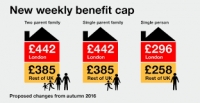New Benefit Cap Comes In - Poor Squeezed as Inflation Will Drive Up Prices
Monday 07 November, 2016 Written by Simon Collyer
The benefit cap has been reduced from £26,000 a year to £20,000 a year in the UK - except in Greater London where the limit is set at £23,000 a year.
Chancellor George Osborne's Budget in July last year included £12bn in welfare cuts.
This is a record £1.503 trillion - the total outstanding lending topped one and a half trillion by the end of September.
- £1,036 - the growth in private debt, including mortgages, for every UK adult.
- 1.656 million - the number of people classed as unemployed between June and August.
- £4,090 - the growth in public sector net borrowing every second in September
- £20.5 billion - The gross mortgage lending in September
- 1%- the lowest English annual regional rent increase in the North East
- £3,252The average amount households with mortgages pay in interest over a year
People in the UK owed £1.503 trillion at the end of September 2016. This is up from £1.451 trillion at the end of September 2015 – an extra £1036.58 per UK adult.
The average total debt per household – including mortgages – was £55,683 in September. The revised figure for August was £55,523.
Per adult in the UK that’s an average debt of £29,770 in September – around 113.7% of average earnings. This is slightly up from a revised £29,685 a month earlier.
Based on September 2016 trends, the UK’s total interest repayments on personal debt over a 12-month period would have been £51.135 billion.
That’s an average of £140 million per day.
This means that households in the UK would have paid an average of £1,894 in annual interest repayments. Per person that’s £1,013 – 3.87% of average earnings.
Per the Office for Budget Responsibility’s July 2015 forecast, household debt is predicted to reach £2.551 trillion in Q1 2021. This makes the average household debt £94,481 (if the number of households in the UK remained the same between now and q1 2021).
Total credit card debt in September 2016 was £65.7bn. Per household this is £2,434 – for a credit card bearing the average interest, it would take 25 years and 6 months to repay if you made only the minimum repayment each month.
The minimum repayment in the first month would be £58 but reduces each month. If you paid £58 every month, the debt would be cleared in around 5 years and 4 months.
Total net lending to individuals by UK banks and building societies rose by £4.7 billion in September 2016 – or £157 per day.
Net mortgage lending rose by £3.1 billion in the month; net consumer credit lending rose by £1.5 Billion.
In Q2 itself they wrote off £504 million (of which £285 million was credit card debt) amounting to a daily write-off, of £5.54 million.
Citizens Advice Bureaux across England and Wales dealt with 598,747 new enquiries in the three months between April and June 2016.
Debt was the second largest advice category (behind benefits) with 371,000 issues. This unchanged on the same period last year. Debt issues represented 26% of all problems dealt with over the period.
2,102 Consumer County Court judgments (CCJs) are issued every day, with an average value of £2,030.
48 mortgage possession claims and 34 mortgage possession orders are made every day. 370 landlord possession claims and 306 landlord possession orders are made every day.
Figures kind courtesy of the Money Charity.
1 comment
Leave a comment
Make sure you enter all the required information, indicated by an asterisk (*). HTML code is not allowed.
Join
FREE
Here










